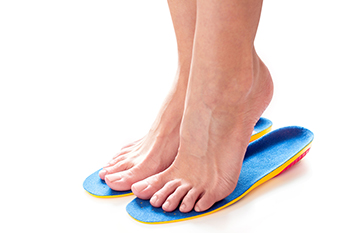
Wearing orthotics may be a wise choice for people who have had a previous foot injury. It may also benefit patients who have an abnormal foot structure, because it may help to realign the foot. There are several types of orthotics that are available, rigid, semi-rigid, cushioned, and flat cushion. A rigid orthotic does not bend and is made of hard materials. The semi-rigid orthotic can be firm and moderately flexible. A cushioned orthotic is not firm and is constructed with cushioning materials. Lastly, an orthotic that does not have support is referred to as a flat cushion. Choosing what type of orthotics to purchase largely depends on the specific foot condition that needs to be addressed. Foot ailments that may require orthotics to be worn can include Morton’s neuroma, bunions, or hammertoe. Additionally, wearing orthotics may be helpful for people who stand for the majority of the day. If you have a certain type of foot condition that may benefit by wearing orthotics, it is suggested that you confer with a podiatrist who can determine what the best type is for you.
If you are having discomfort in your feet and would like to try orthotics, contact Edward Gonzalez, DPM from Lower Extremity Care. Our doctor can provide the care you need to keep you pain-free and on your feet.
What Are Orthotics?
Orthotics are inserts you can place into your shoes to help with a variety of foot problems such as flat feet or foot pain. Orthotics provide relief and comfort for minor foot and heel pain but can’t correct serious biomechanical problems in your feet.
Over-the-Counter Inserts
Orthotics come in a wide variety of over-the-counter inserts that are used to treat foot pain, heel pain, and minor problems. For example, arch supports can be inserted into your shoes to help correct overarched or flat feet, while gel insoles are often used because they provide comfort and relief from foot and heel pain by alleviating pressure.
Prescription Orthotics
If over-the-counter inserts don’t work for you or if you have a more severe foot concern, it is possible to have your podiatrist prescribe custom orthotics. These high-quality inserts are designed to treat problems such as abnormal motion, plantar fasciitis, and severe forms of heel pain. They can even be used to help patients suffering from diabetes by treating foot ulcers and painful calluses and are usually molded to your feet individually, which allows them to provide full support and comfort.
If you are experiencing minor to severe foot or heel pain, it’s recommended to speak with your podiatrist about the possibilities of using orthotics. A podiatrist can determine which type of orthotic is right for you and allow you to take the first steps towards being pain-free.
If you have any questions please contact our office located in Miami, FL . We offer the newest diagnostic and treatment technologies for all your foot and ankle needs.
